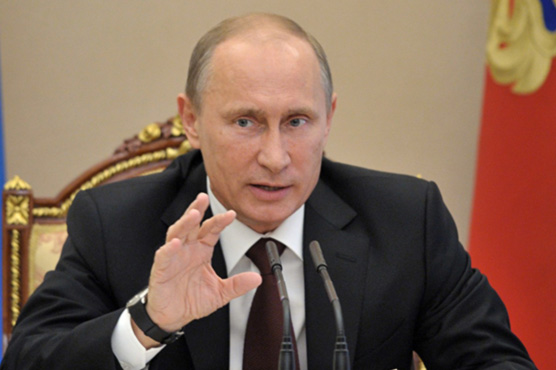New age of discord as Putin rips up post-Soviet order: analysts

Analysts say Putin has shown readiness to redraw Russia's current frontiers and shatter the order.
MOSCOW (AFP) - Russia is heading to a new era of confrontation with the West as President Vladimir Putin reasserts Kremlin power by tearing up the post-Soviet order that prevailed for over two decades, analysts say.
On December 8, 1991 then Russian President Boris Yeltsin and the leaders of Ukraine and Belarus met at a remote dacha to sign the document that effectively dismembered the USSR into independent states.
But by snatching Crimea from Ukraine, Putin has shown a readiness to redraw Russia s current frontiers and shatter the order that dates from the so-called Belovezhskaya Accords.
It remains unclear whether Putin will stop there or will be tempted to take other Russian-speaking regions from Ukraine, Moldova or even Belarus and Kazakhstan.
But what is clear from Russia s lightning takeover of Ukraine s Russian-speaking peninsula and a landmark Kremlin speech by Putin on Tuesday is the Russian strongman s sense of mission to restore Russian power.
"We are at the start, but not at the end, of a stormy development of events," said Nikolai Petrov, professor at the Higher Economic School in Moscow.
"Putin s speech concluded the current stage of the absorbtion of Crimea. The question is, what happens next?" he said.
- Resisting containment -
Putin made clear that Russia was tired of being "pushed into a corner" by the West who he accused of "time and again deceiving us and taking decisions behind our backs".
Putting the standoff into a historic context, he said that the West was persisting with its policy of "containment" towards Russia which had been in place during the 18th and 19th centuries of Tsarist rule and the 20th century under the Soviet Union.
"Everything has its limits," said Putin, warning that the West had "crossed a line" by helping install an anti-Kremlin government in Kiev after the overthrow of president Viktor Yanukovych.
Petrov said there would be a "new Cold War" if Putin took any moves that went beyond the taking of Crimea.
"This is the beginning of the game. The sides have exchanged predictable moves but now comes the exchange of unpredictable blows," he said.
Putin in his speech blasted the world order that took shape after the collapse of the "bipolar" system when the USSR disintegrated, saying it had allowed the US to disregard international law from Yugoslavia to Iraq and Libya.
In a sign of where Russia s diplomatic priorities now lie, he reached out to China and India.
"Putin has declared war on the West and no reconciliation is possible," said Petrov. "Now the West will play for the liquidation of the Putin regime."
Dmitry Trenin, director of the Carnegie Centre in Moscow, described Russia s seizure of Crimea as a "watershed" in its foreign policy.
"Up until now Moscow only talked about red lines," he said. "The post-Soviet settlement in Eastern Europe is now history."
- Redrawing the post-USSR map -
For Putin and many Russians, the incorporation of Crimea into Russian territory simply rights a historic wrong that resulted in the Russian-speaking region ending up in post-Soviet Ukraine.
Crimea was transferred to the Soviet republic of Ukraine by Communist Party chief Nikita Khrushchev in 1954, a decision that Putin said may have been motivated by his guilt in organising "mass repressions" in Ukraine in the 1930s.
But the sheer fact that Putin sent pro-Moscow forces into Crimea to seize the region shows a disregard for the borders set in 1991.
Russia may be the biggest country in the world by landmass, but it is still a shrunken entity compared with the reach it enjoyed during the Tsarist Russian Empire and Communist rule.
"Putin can feel he has triumphed," wrote the business daily Vedomosti. "Russia, in his opinion, has refused to fulfil the rules of the unfair Belovezhskaya world order."
In his speech, Putin portrayed Russians as the victims of the break-up of the USSR, an event he once famously described as the greatest geo-political tragedy of the 20th century.
"What seemed unthinkable, unfortunately, became reality and the USSR collapsed," he said.
Putin said millions of Russians had woken up in 1991 in foreign countries and Russians could now be described as the "most dispersed people in the world."
His remarks raise the question of whether the Crimea swoop will be a one-off or will be followed by the "return" of other Russian-speaking territories.
A Russian move into east or southern Ukraine would mark an even greater escalation. Lawmakers in the Russian-speaking separatist Moldovan territory of Transdniestr have already asked to become part of Russia.
Timofei Bordachev, deputy editor of the pro-Kremlin, Russia in Global Policy Journal, said further actions would depend as much on the behaviour of the United States as Russia.
"A free, independent and neutral Ukraine could be a guarantor of peace in central Europe. Russia in that case would not continue its active policies in the east and southeast of Ukraine," he said.

